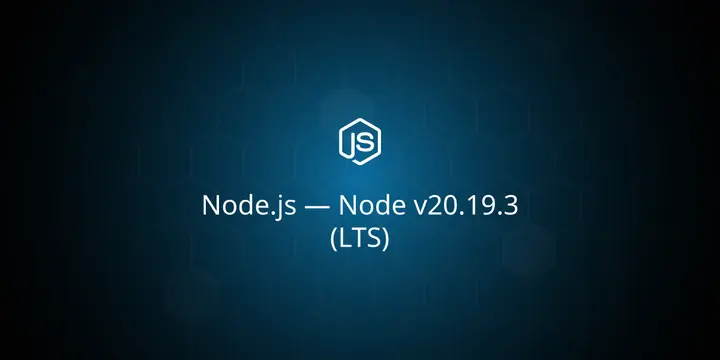Node.js version 20.19.3 (LTS) has been released, bringing several important updates to enhance its functionality and security. Key features include the stabilization of the Gradient WebCryptoAPI algorithms, an upgrade of root certificates to NSS 3.108, and a timezone update to 2025b. The release also contains updates to the International Components for Unicode (ICU), Corepack, and SIMDUTF versions, which improve performance and compatibility.
Noteworthy changes in this version involve the graduation of the WebCryptoAPI Ed25519 and X25519 algorithms to stable status, allowing for a length of 0 in HKDF and PBKDF2 within the SubtleCrypto.deriveBits method, and adjustments to make FILE_OFFSET_BITS=64 operational on 32-bit systems.
In addition to these enhancements, numerous commits have been made that address various aspects of the Node.js environment, including documentation improvements, dependency updates, and fixes for specific bugs. The updates aim to streamline development processes, enhance security features, and improve overall user experience.
Node.js continues to serve as a free, open-source, cross-platform JavaScript runtime environment, enabling developers to build a diverse range of applications, including servers, web apps, command-line tools, and scripts.
Extended Overview:
The release of Node.js 20.19.3 (LTS) is part of the ongoing commitment to maintain a robust and secure runtime environment for JavaScript. With the increasing demand for web applications and server-side JavaScript, the enhancements provided in this version are crucial for developers looking to leverage the latest cryptographic standards and ensure their applications are compliant with modern security protocols.
Moreover, the inclusion of timely updates such as the timezone update to 2025b signals Node.js's adaptability to global changes, making it an appealing choice for developers working on international applications. The decision to stabilize certain algorithms reflects the community's focus on reliability and performance, ensuring that developers can rely on these tools in production environments.
As the ecosystem surrounding Node.js continues to evolve, future releases are likely to introduce even more features aimed at improving developer experience and application performance, such as better support for ECMAScript modules, enhanced debugging tools, and improved package management capabilities through Corepack.
In conclusion, Node.js version 20.19.3 represents a significant step forward in creating a secure, versatile, and efficient platform for JavaScript development, and it sets the stage for continued innovation in the years to come
Noteworthy changes in this version involve the graduation of the WebCryptoAPI Ed25519 and X25519 algorithms to stable status, allowing for a length of 0 in HKDF and PBKDF2 within the SubtleCrypto.deriveBits method, and adjustments to make FILE_OFFSET_BITS=64 operational on 32-bit systems.
In addition to these enhancements, numerous commits have been made that address various aspects of the Node.js environment, including documentation improvements, dependency updates, and fixes for specific bugs. The updates aim to streamline development processes, enhance security features, and improve overall user experience.
Node.js continues to serve as a free, open-source, cross-platform JavaScript runtime environment, enabling developers to build a diverse range of applications, including servers, web apps, command-line tools, and scripts.
Extended Overview:
The release of Node.js 20.19.3 (LTS) is part of the ongoing commitment to maintain a robust and secure runtime environment for JavaScript. With the increasing demand for web applications and server-side JavaScript, the enhancements provided in this version are crucial for developers looking to leverage the latest cryptographic standards and ensure their applications are compliant with modern security protocols.
Moreover, the inclusion of timely updates such as the timezone update to 2025b signals Node.js's adaptability to global changes, making it an appealing choice for developers working on international applications. The decision to stabilize certain algorithms reflects the community's focus on reliability and performance, ensuring that developers can rely on these tools in production environments.
As the ecosystem surrounding Node.js continues to evolve, future releases are likely to introduce even more features aimed at improving developer experience and application performance, such as better support for ECMAScript modules, enhanced debugging tools, and improved package management capabilities through Corepack.
In conclusion, Node.js version 20.19.3 represents a significant step forward in creating a secure, versatile, and efficient platform for JavaScript development, and it sets the stage for continued innovation in the years to come
Node v20.19.3 (LTS) released
NodeJS 20.19.3 (LTS) has been released, featuring several significant updates. Significant updates include the stable Gradient WebCryptoAPI algorithms, improved root certificates to NSS 3.108, and a timezone change to 2025b. The build incorporates updates to the ICU, Corepack, and SIMDUTF versions. The commits include making FILE_OFFSET_BITS=64 work for 32-bit systems, using glob for dependencies in out/Makefile, allowing length=0 for HKDF and PBKDF2 in SubtleCrypto.deriveBits, and updating simdutf to version 6.4.2.


